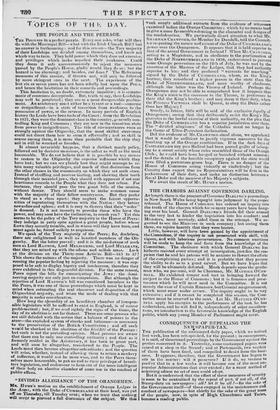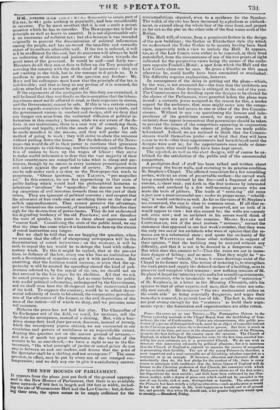CONSEQUENCES OF REPEALING THE NEWSPAPER-TAX.
THE publication of the unstamped daily paper, which we noticed last week, has been relinquished, for the present ; in consequence, it is said, of threatened proceedings by the Government against the parties concerned in it. Yesterday, some unstamped papers were seized at a shop in the Strand; and at Portsmouth, two venders
of them have been fined, and compelled to desist from the busi- ness. It appears, therefore, that the Government has begun to stir in the matter: will it persevere? If it do, we venture to pred;ct that in a few weeks it will become one of the most un- popular Administrations that ever existed ; for a surer method of acquiring odium no set of men could adopt.
But it is understood that the effect of these measures of severity is soon to be neutralized by the repeal of part, if not all, of the Stamp-duty on newspapers : all! let it be all /—for the sake of the Government itself—of those engaged in the maintenance and conduct of newspapers—but chiefly for the sake of the great mass of the people, now, in spite of High Churchmen and Tories, become a reading public. Hat. bPitiblo itics o n tit% detei ttttt w twain part of tie tux, he wit gain ',tolling in popularity, and lose considerably in revenue. For he must recollect that it is not n erely a money question which he has to consider. The Newspaper-tax is bad in principle as well se; heavy in amount. It is not objectionable only a an enormous ad valorem tux; but also because it was intended originally to prevent the dissemination of political information among the people, and has answered the impolitic and cowardly object of its authors admirably well. If the tax is redeced, it will net be soefficient for this end, but its existence will always be held an indication of distrust and jealousy of the rulers towards the great mass of the governed. It would be said—and fairly too—
Ministers do all they can or dare to follow up the Tory principle of coveting the country with the thick cloud of ignorance : they are not aauting in the wish, but in the courage to di grade us. It is needless to pursue this part of the question any further: Mr. RICE and his colleagues must know that the principle of the tax is indefensible; and that as long as any portion of it is retained, the odium attached to it cannot be got rid of.
If the arguments of the apologists for this duty are examined, it will be found that they rest finally on the assu mption that the labour- ing classes must not be allowed to read, or their superiors in station,
and the Government, cannot be safe. It' this is to a certain extent true as regards countries where the upper classes are tyrants, and the government vicious in conduct and design, still we deny that any danger can arise from the unlimited diffusion of political in- formation in this country ; because, while we are aware of the de- fects in our institutions, there is a sure way of remedying them, peaceably and legally, within the reach of the people. Let this be made manifest to the masses, and they will prefer the safe method of going to work ; they will strive to abate the nuisance
without pulling going the house. But the defenders of the News- paper-tax would do all in their power to continue that ignorance which prompts to rick-burning, machine-breaking, and the forma- tion of unions to force up the wages of labour : they strive to make useful information so dear that the vast majority of their fellow countrymen are compelled to take what is cheap and per- nicious, though by no means in every instance promulgated with evil intent against the good order of society. No government can be safe under such a system as the Newspaper-tax tends to perpetuate. "Omne ignotum," says TACITUS, "pro magnifico est." In this country, we are fast approaching to that state of public feeling which would lead the philosophical historian to substitute "invidioso" for "magnifico:" the masses are becom- ing suspicious of evil intention towards them on the part of their rulers. They are ignorant of political economy ; and suspect that the advocates of free trade aim at sacrificing them on the altar of selfish aggrandizement. They cannot perceive the advantage, and to themselves the necessity, of machinery ; and therefore they sigh for the destruction of power-looms. They do not understand the degrading tendency of' the old Poor-laws; and are therefore the tools of quacks, who prate to them about oppression and "coarser food." Considering the state of the public mind, we say that the time has come when it is hazardous to dam up the sluices of sound instruction any longer.
But we shall be told that we are begging the question, when we assume that the effect of cheapening newspapers will be the dissemination of sound instruction : on the contrary, it will be said, to repeal the tax would be to deluge the land with inflam- matory trash. To this it might be replied, that at the present time, in defiance of the law, every one who has an inclination for such a description of stimulus can get it with perfect ease. But admitting that the facilities would increase, or even that the op- portunity we uld be created for spreading abroad the kind of pub- lications referred to, by the repeal of the tax, we should not on that account be the less eager for its abolition. All that we ask for sound principles is fair play. Let us come before the public with useful political information, unhampered by the Government, and we shall soon beat the ill-disposed and the uninstructed out of the held. To suppose the contrary, would be to admit the es- sential inferiority of truth to falsehood, the comparative powerless- ness of the advocates of the former, or the evil dispositions of the mass of the nation—all of which we deny, and we presume none will maintain.
Hitherto the press has not had fair play. The Chancellor of the Exchequer out of the field, we could, fin- instance, sell the Spectator for sevenpence, instead of a shilling. But, with a four- penny stamp-duty (and four per mat. discount, instead of twenty, , which the sevenpenny papers obtain), we are contracted in our circulation and powers of usefulness to an unjustifiable extent. Arguing this question not on the narrow ground of revenue,— and it is of much too great importance to the welfare of the country to be so considered,—we have a right to say to the Go- vernment, "On what principle of justice or sound policy do you step in between us and our readers, and decree that the price of the Spectator shall be a shilling.and not sevenpence?" The same question, in effect, may be put by every one of our stamped con- temporaries; and we defy any one to give it a satisfactory answer.



























 Previous page
Previous page